Graham Reid | | 8 min read
Jennifer Zea: Satelite
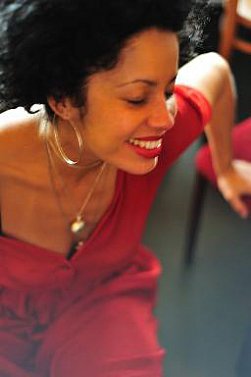
Singer and songwriter Jennifer Zea is quite a colourful flower in the landscape of New Zealand music. The Venezuelan-born singer and songwriter has impressed in live performances for her vigorous and vital enthusiasm, and her album The Latin Soul – produced by Nathan Haines and reviewed here – captures her melange of styles, wraps them up in pop-jazz compatibility and is executed by some of the classiest local players you could call on.
With Latin volubility, Zea – a trained architect as well as musician – is an engaging interview subject and what follows is a lengthy (but still a heavily edited) profile-cum-transcript which conveys just some part of her widescreen world and interests.
Aside from the broadly Latin-framed album, she works with “world music mish-mash hip-hop DJ thing” which has seen her open for the Black Seeds, plays in a duo as Latin Aotearoa with Bobby Brazuka, has done a few shows with the trimmed-down jazz line-up (“Because that band is very expensive”) and she speaks of a forthcoming three week tour: “A madness tour. Paris to London then Madrid, Amsterdam to Barcelona, it's the hip-hop thing.”
“And I also work with some guys in Wellington who have a fun band, some of the guys from Black Seeds and Fat Freddy's Drop and they have a band which does crazy Haitian, Caribbean stuff . . . and we dress in Japanese clothes.
“Even though I've done jazz for many years you spotted right off that I have soft spot for pop and the new tendencies. That is what I spent half of my career doing with ska and rock, and writing pop songs for pop bands in my country when I was touring with the ska band.”
People in this country get very excited about people like you who come from what we see as an exotic place, but I guess you grew up hearing Madonna, Michael Jackson and Nirvana just like kids everywhere.
Yeah, but that is not expected really from where I was born [in Falcon] which was a little town which is sleepy with a lot of goats and dunes and oil processing. But my brother won a scholarship [to Detroit] and my parents thought he was too young, and the first they saw when they visited him was with an Afro and smoking weed.
So they said, 'Right the whole family is moving there to see what is going on'. I was eight when I went there and was 14 when we got back home.
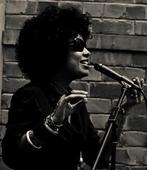 So you wouldn't have heard a lot of
Venezuelan music at that time other than what your mum and dad were
playing at home?
So you wouldn't have heard a lot of
Venezuelan music at that time other than what your mum and dad were
playing at home?
Exactly, because the reference was my parents. I remember from the age of five the music in the house and the influence of my brother who loved disco. The Latino side I didn't want to accept, but I'm embracing it now that I am an older woman, because that's what happens when you get old. That's the wisdom of life.
Zea says on her mother's side her mother and grandmother would have loved to have been professional singers and she grew up with her mother's regret. In Detroit before going school she would tune in to the “awesome radio with Motown and r'n'b” as well loving Michael Jackson whose poster she had on her wall, alongside Quiet Riot.
The first thing I did in music was heavy metal was when I was 20. You can still see videos on You Tube of Agata, it's 'Agatha' who was the guitarist and leader. We were were underground but well known. The band was formed for many years and they needed a singer and I was the only person they could find who could peak English correctly and who had an understanding of soul, which was interesting in the context of heavy metal. I didn't care that it was heavy metal, all I wanted was to have fun and express myself.
The all-woman band wrote their own songs but only lasted a few years after her arrival (“I killed it, we didn't get along the guitarist and me”) and then she was pulled into the ska band Desorden Publico which toured everywhere in Latin America and recorded in Puerto Rico.
Zea says in Agata she had to use a big voice at every show so it was damaging – “it was about being young and crazy and doing drugs and being loud, and being cheeky on stage and getting away with everything” - but the ska band taught her how to project into a large room and she got her taste of Latin back.
When I say ska people probably think like Madness, and they loved that and came from a punk background, but what made them big in Latin America was the fusion with merengue and some Cubano and the dynamics of big salsa band.
She enjoyed the rediscovery of her Latin background while having fun and the band also allowed her to become more of a performer and interact with the audience rather than simply showcasing her voice. She also admits she wasted any opportunity she might have by being young and hard-headed and stubborn.
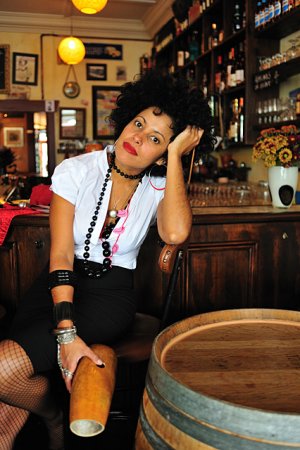 I was the only girl and for a month in
LA we were eight guys and a girl in one room, and you can imagine
tension builds up. I regret some of the things I did in the band and
one of things I like about this [Latin Soul] album is I reconcile the
past, the song Satelite is a reconciliation and a homage to the guys
in Desorden Publico.
I was the only girl and for a month in
LA we were eight guys and a girl in one room, and you can imagine
tension builds up. I regret some of the things I did in the band and
one of things I like about this [Latin Soul] album is I reconcile the
past, the song Satelite is a reconciliation and a homage to the guys
in Desorden Publico.
After that I did jazz, it was the next element after rock and ska, and jazz was big in music there. I wanted to learn and go one step beyond so I started to sing with important cats in jazz over there and learned how to improvise and how to listen the rest of the band, and be musically aware.
Then she moved into bossa nova for a decade which was a step further up (“quite a complex rhythm and I learned how to control the voice and become the mature singer”) and describes the sound as “music on the edge”. Pianist Jonathan Crayford who plays on the album has that quality, “Atonal, almost not in key.”
Four years ago she arrived in New Zealand after time in Melbourne (“I am moving around the globe to the right and there was no one else to go”), a country she had glimpsed in The Piano and thought exotic.
While in Melbourne her music career had been mostly in hiatus while she brought her daughter (there is a digression into being a mother and relationship with her own mother) and when she came to New Zealand she had few musical contacts. She explored some and none were satisfying until she met pianist Kevin Field and began working and writing with him.
He knew how to accompany me and how to interpret what I want and has a Bill Evans quality of elegance which I appreciate.
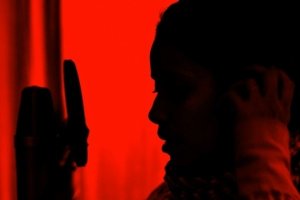 Over time she linked up with the likes
of percussion player Miguel Fuentes – with whom she also writes –
and that eventually lead to the idea of an album and meeting Nathan
Haines who came on board as producer as well as playing saxes and
flute in the sessions. What she appreciated was that they
accepted her as a musician even though she doesn't write music. And
does she play an instrument? She laughs.
Over time she linked up with the likes
of percussion player Miguel Fuentes – with whom she also writes –
and that eventually lead to the idea of an album and meeting Nathan
Haines who came on board as producer as well as playing saxes and
flute in the sessions. What she appreciated was that they
accepted her as a musician even though she doesn't write music. And
does she play an instrument? She laughs.
Look . . . no. I studied architecture instead. I can read more or less and I use the piano to do my scales, but I use it like an old lady would dial on a new phone. I can sing the melody and so I go 'me' and 're' and just two lines and verse and then say to the others 'Take it away from there'.
I have a voice and that is an instrument but many people don't realise that. I can do the bass and horns in my voice, so it's not an odd thing to say 'I sang the horns to Mike [Booth]'. He knows how to write it on paper and can polish it up to have harmonies for trombone and sax, so there we go.
It's frustrating that some people want to take more credit than you just because I don't play an instrument.
But I have done so many things I can just say 'Fuck it, I will start learning an instrument again'. But the things I know come from so many years with so many different musicians and just getting on stage and doing it.
That's what I appreciated with Jonathan, I felt this embrace and respect from a bright musician who knows his thing and sees I can talk his language and can improvise on what he throws at me.
She says met Crayford when Field wasn't available and mid set he put away her charts.
I'm thinking, 'What the fuck are you doing?' but I start singing and it became a competition and rush and it was so much fun.
Zea says her album wasn't made for New Zealand but to reconcile her past and say “this is the grown up me and I celebrate that and like it better than ever before”.
This is the voyage to change countries and change the way of thinking and to change things in my life. Destiny put everything there so easy. It was hard work, but it was easy because I didn't have to convince anyone much, they wanted to be in, from Kevin who was the first person I worked with to the guy who designed the album cover to the woman who did the PR, and everyone in the middle was thrilled to be in it.
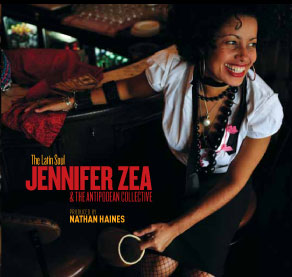 The Latin Soul album is being sent out
to as many people overseas as she can -- 10 Latino radio station
ordered it from US and are playing tracks – and she when she
considers the process she goes for an analogy from her past, a
reference to the career she trained for but hasn't worked in since
2001.
The Latin Soul album is being sent out
to as many people overseas as she can -- 10 Latino radio station
ordered it from US and are playing tracks – and she when she
considers the process she goes for an analogy from her past, a
reference to the career she trained for but hasn't worked in since
2001.
This is as a complex as doing a house with the blueprints, the design. First there is pencil on paper and you have to put that in measurements then you have to comply with laws and the engineer has to come in and then you have to make beautiful renders to sell it to clients . . . then there are the details and adornments.
It's the same with an album.
She pays genuine tribute to all those she has worked with -- especially Fuentes, Crayford, Field and Haines – but also says once the album has run a course she wants to take the material and do something different with it. The album touched a formal part of her career, but she still wants to be out there on the edge with a younger audience and feels this is a place from which she can do both.
I wasn't getting what I wanted in my country so I had to leave to explore to get. And oddly enough this is called 'New Zea-land'. I'm quite spiritually orientated and I read the Tarot and am into crystal healing and it was like, 'This is the place'.
I really feel the energy coming through the soles of my feet in this place.
For more on Nathan Haines start here, and for Kevin Field look here.

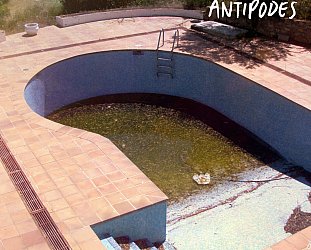
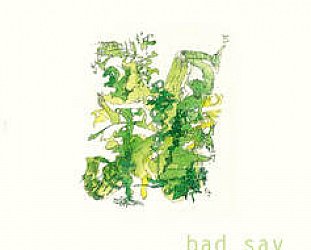
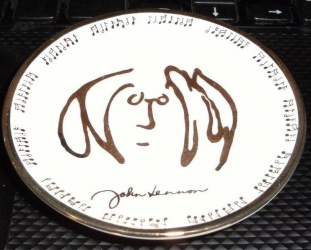

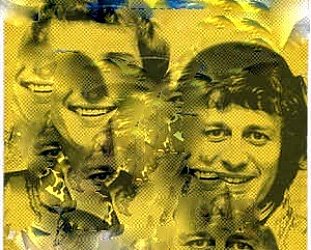

post a comment